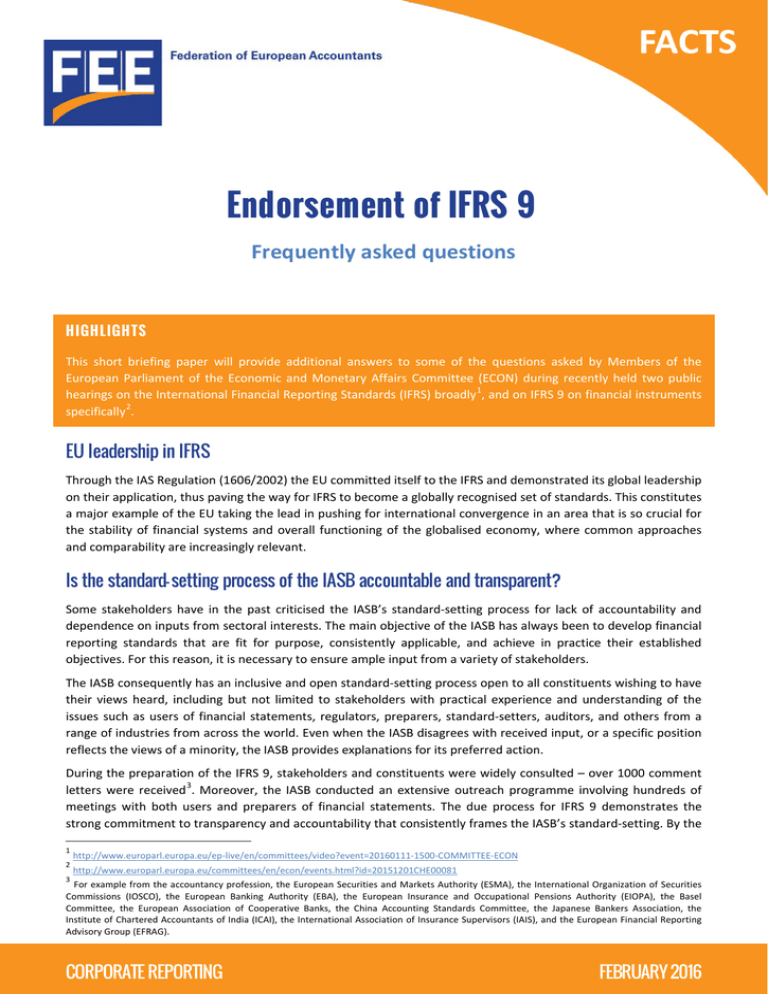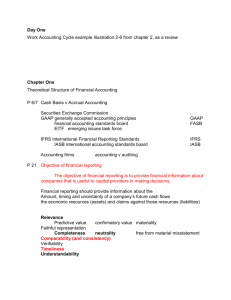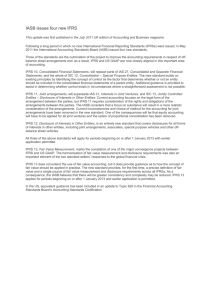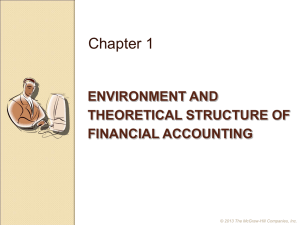Endorsement of IFRS 9 Frequently asked questions HIGHLIGHTS
advertisement

Endorsement of IFRS 9 Frequently asked questions H IGH LIGH TS This short briefing paper will provide additional answers to some of the questions asked by Members of the European Parliament of the Economic and Monetary Affairs Committee (ECON) during recently held two public hearings on the International Financial Reporting Standards (IFRS) broadly 1, and on IFRS 9 on financial instruments specifically 2. EU leadership in IFRS Through the IAS Regulation (1606/2002) the EU committed itself to the IFRS and demonstrated its global leadership on their application, thus paving the way for IFRS to become a globally recognised set of standards. This constitutes a major example of the EU taking the lead in pushing for international convergence in an area that is so crucial for the stability of financial systems and overall functioning of the globalised economy, where common approaches and comparability are increasingly relevant. Is the standard- setting process of the IASB accountable and transparent? Some stakeholders have in the past criticised the IASB’s standard-setting process for lack of accountability and dependence on inputs from sectoral interests. The main objective of the IASB has always been to develop financial reporting standards that are fit for purpose, consistently applicable, and achieve in practice their established objectives. For this reason, it is necessary to ensure ample input from a variety of stakeholders. The IASB consequently has an inclusive and open standard-setting process open to all constituents wishing to have their views heard, including but not limited to stakeholders with practical experience and understanding of the issues such as users of financial statements, regulators, preparers, standard-setters, auditors, and others from a range of industries from across the world. Even when the IASB disagrees with received input, or a specific position reflects the views of a minority, the IASB provides explanations for its preferred action. During the preparation of the IFRS 9, stakeholders and constituents were widely consulted – over 1000 comment letters were received 3. Moreover, the IASB conducted an extensive outreach programme involving hundreds of meetings with both users and preparers of financial statements. The due process for IFRS 9 demonstrates the strong commitment to transparency and accountability that consistently frames the IASB’s standard-setting. By the 1 2 3 http://www.europarl.europa.eu/ep-live/en/committees/video?event=20160111-1500-COMMITTEE-ECON http://www.europarl.europa.eu/committees/en/econ/events.html?id=20151201CHE00081 For example from the accountancy profession, the European Securities and Markets Authority (ESMA), the International Organization of Securities Commissions (IOSCO), the European Banking Authority (EBA), the European Insurance and Occupational Pensions Authority (EIOPA), the Basel Committee, the European Association of Cooperative Banks, the China Accounting Standards Committee, the Japanese Bankers Association, the Institute of Chartered Accountants of India (ICAI), the International Association of Insurance Supervisors (IAIS), and the European Financial Reporting Advisory Group (EFRAG). CORPORATE REPORTING FEBRUARY 2016 standards of international organisations, the IASB has achieved significant levels of openness and public exposure coupled with extensive expert-input. Why and how is the impairment model between the IASB and the FASB different? Following the eruption of the financial crisis in 2008, the IASB and the US FASB agreed to together revise accounting standards for financial instruments. The two standard-setters eventually took different paths, and ended up with differing approaches to impairment of financial instruments. In general, the differences between the accounting standards issued by the FASB and the IASB can be explained by the fact that they reflect different underlying economic systems. This is also a major reason for differences between IFRS 9 and the equivalent FASB proposals. Moreover, due to how the existing US standards have been applied, for the US to move to the IASB’s Expected Credit Loss model would not achieve the objective for a more forward looking approach regarding impairment of financial instruments. More specifically, the US forthcoming standard provides for lifetime expected losses from day one, whilst IFRS 9 provides for lifetime expected losses only when there is a significant credit risk increase. As such, the proposed US GAAP impairment model makes no allowance for the fact that financial institutions are compensated for expected credit losses through the interest rate that they charge to borrowers. Consequently, recognising lifetime credit losses for all loans from the moment they have been granted distorts the reporting of the entity’s performance. This is particularly the case in those jurisdictions where the average maturities of outstanding loans exceed those in the US, such as in Europe. Recording lifetime losses immediately may impact on lending behaviours and may lead to reduced appetite in particular with regard to long-term finance. Because of these considerations there is a wide consensus amongst different constituents that the IFRS 9 impairment model, with its emphasis on credit deterioration as the trigger for providing expected lifetime losses, provides more relevant information for investors. A study commissioned by the European Parliament titled Accounting for Financial Instruments: the FASB and the IASB IFRS 9 Approaches 4 confirms that the two approaches are at least as good. How is IFRS 9 an improvement from IAS 39? First, IFRS 9 is better linked to business models and thus provides for appropriate classification of financial assets, whilst IAS 39 is more rule-based. Second, IFRS 9 has a forward-looking impairment model which is more in line with G20’s request. The impairment model has been criticised for lack of ambition, but it constitutes a realistic compromise between operational practice and a conceptually pure complex solution. Third, IFRS 9 is better linked with banks’ regulatory requirements. And fourth, the IFRS 9 hedge accounting is more aligned with corporates’ risk management practices. Is IFRS 9 a complex standard? Some stakeholders have raised concerns that the IFRS 9 will increase complexity in financial reporting. However, the complexity of a standard reflects the complexity of its target. In the last few years, contracts that include financial instruments have become increasingly complicated. Furthermore the classification and measurement criteria of the IFRS 9 reflect better the business model, which, in the recent years, has become even more complex. Therefore the financial reporting standard dealing with such transactions inherently has an increased complexity. What is the issue with the endorsement of IFRS 9? EFRAG’s endorsement advice 5 to the European Commission states: “[…]we [EFRAG] […] recommend that all businesses other than those carrying out insurance activities are required to account for their financial instruments in compliance with IFRS 9 in 2018 and that businesses carrying out insurance activities are permitted to do so in compliance with IFRS 9 from the same date […]”. 4 5 http://www.europarl.europa.eu/RegData/etudes/STUD/2015/563463/IPOL_STU(2015)563463_EN.pdf http://www.efrag.org/files/IFRS%209%20endorsement/IFRS_9_Final_endorsement_advice.pdf 2 The insurance industry has raised concerns regarding the non-alignment of the effective dates of IFRS 9 and the new standards on insurance contracts, which is expected to become effective 2021 at the latest. Stakeholders from the sector fear that different effective dates may for example lead to accounting mismatches, confusion for users of financial statements, and additional costs and complexity for preparers of statements, due to two significant accounting changes within a short period. Consequently, some constituents have called for deferring the endorsement of the standard for Europe until this issue has been adequately addressed either by the IASB or the EU. What is being done to address the concerns of the insurance sector? While the majority of constituents believe that IFRS 9 is a better standard to account for financial instruments and are asking for its swift endorsement, they acknowledge the concerns raised by the insurance sector. An international solution is preferable. Unilateral European action would constitute a de facto carve-out from full IFRS which should be avoided as they do not come without consequences. Any EU-specific solution should only be considered as a last resort if the IASB fails to deliver a workable solution. The IASB discussed and agreed on two alternative solutions to address the issue. The IASB published an Exposure Draft on this matter in December 2015 6 and a final proposal is expected around mid-2016. Delaying the endorsement process however would be detrimental for the banking sector as the banks will not have adequate time to properly implement the new requirements. Why has there been no comprehensive impact assessment on the expected effects of IFRS 9? The simple answer is that no one has yet implemented the standard, and, due to the complexity of the financial instruments covered by IFRS 9’s scope, it is very difficult to predict outcomes. Implementation involves significant investment of time and resources, and consequently concerned stakeholders are reluctant to begin implementation before the standard has been fully endorsed. Having said that, the standard has gone through an extensive standard-setting process governed by continuous expert advice and feedback, both from academics as well as practitioners with practical understanding of the sector and financial products concerned. This has ensured that the proposed standard should appropriately address identified challenges and limitations, and constitutes an apt compromise between a conceptually pure model and operational feasible standard. FEE’s position on the endorsement of IFRS 97 FEE supports a swift endorsement of IFRS 9 in the EU, and endorses international solutions to address issues arising from the non-alignment of the effective date of IFRS 9 and the future standard on insurance contracts for institutions with significant insurance activities. Preparers will need time to implement the new requirements but will hesitate to begin the process until uncertainty surrounding the endorsement is resolved. Should you require any further information on this matter, please do not hesitate to contact Pantelis Pavlou, Manager, from the FEE Team on +32 (0)2 893 33 74 or via e-mail at pantelis.pavlou@fee.be. 6 http://www.fee.be/library/list/50-corporate-reporting/1562-fee-comments-on-iasb-s-ed-applying-ifrs-9-financial-instruments-with-ifrs-4-insurancecontracts.html 7 http://www.fee.be/component/content/article.html?id=1541&lang=en&Itemid=106 DISCLAIMER: FEE disclaims any responsibility resulting from the use of, or reliance on, the information contained in this document. 3 W H O W E ARE FEE represents 50 professional institutes of accountants and auditors from 37 European countries, with a combined membership of over 875,000 professional accountants working in different capacities. As the voice of the European profession, FEE recognises the public interest. FEE is in the EU Transparency Register (No 4713568401-18).



